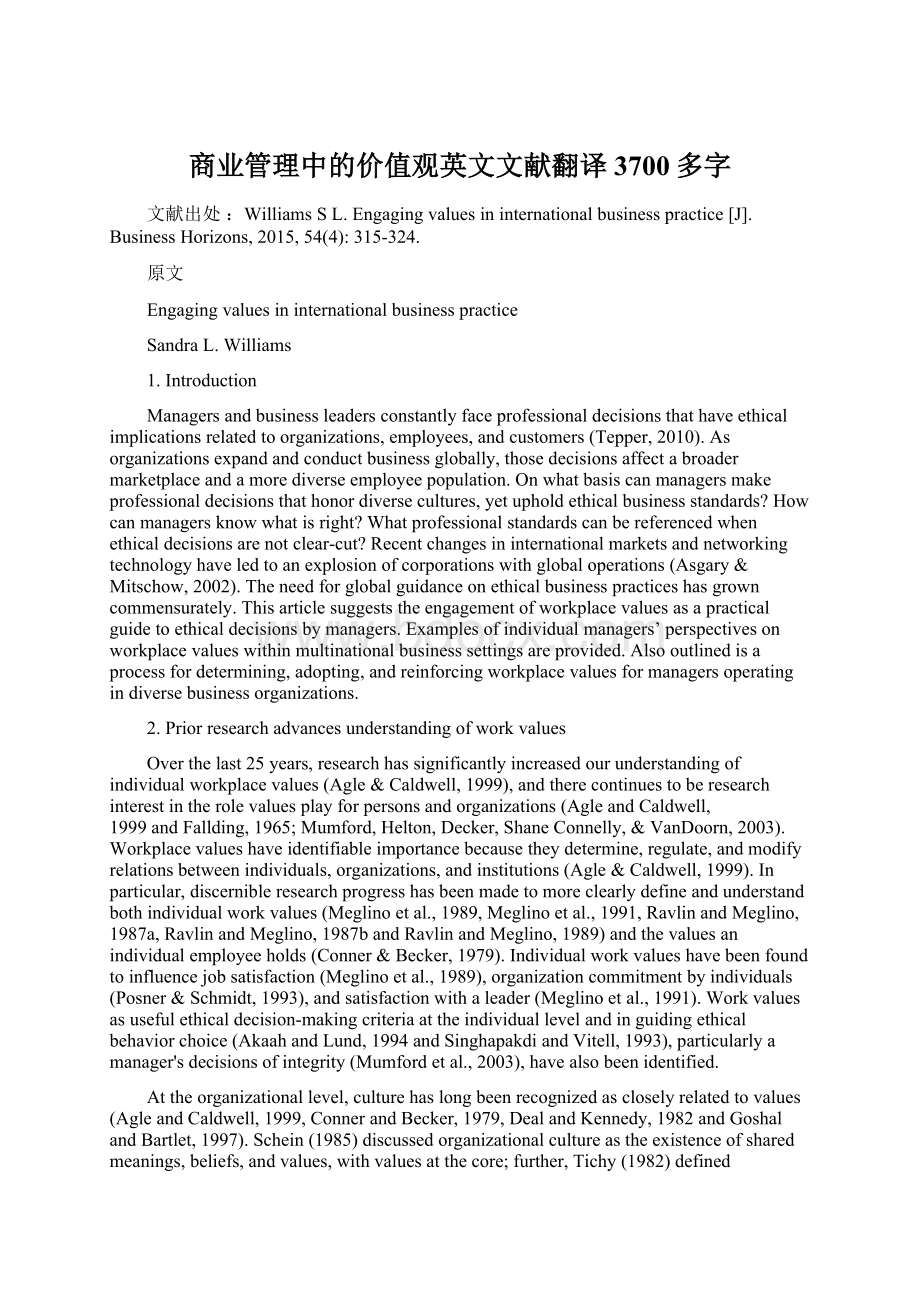商业管理中的价值观英文文献翻译3700多字.docx
《商业管理中的价值观英文文献翻译3700多字.docx》由会员分享,可在线阅读,更多相关《商业管理中的价值观英文文献翻译3700多字.docx(6页珍藏版)》请在冰豆网上搜索。

商业管理中的价值观英文文献翻译3700多字
文献出处:
WilliamsSL.Engagingvaluesininternationalbusinesspractice[J].BusinessHorizons,2015,54(4):
315-324.
原文
Engagingvaluesininternationalbusinesspractice
SandraL.Williams
1.Introduction
Managersandbusinessleadersconstantlyfaceprofessionaldecisionsthathaveethicalimplicationsrelatedtoorganizations,employees,andcustomers(Tepper,2010).Asorganizationsexpandandconductbusinessglobally,thosedecisionsaffectabroadermarketplaceandamorediverseemployeepopulation.Onwhatbasiscanmanagersmakeprofessionaldecisionsthathonordiversecultures,yetupholdethicalbusinessstandards?
Howcanmanagersknowwhatisright?
Whatprofessionalstandardscanbereferencedwhenethicaldecisionsarenotclear-cut?
Recentchangesininternationalmarketsandnetworkingtechnologyhaveledtoanexplosionofcorporationswithglobaloperations(Asgary&Mitschow,2002).Theneedforglobalguidanceonethicalbusinesspracticeshasgrowncommensurately.Thisarticlesuggeststheengagementofworkplacevaluesasapracticalguidetoethicaldecisionsbymanagers.Examplesofindividualmanagers’perspectivesonworkplacevalueswithinmultinationalbusinesssettingsareprovided.Alsooutlinedisaprocessfordetermining,adopting,andreinforcingworkplacevaluesformanagersoperatingindiversebusinessorganizations.
2.Priorresearchadvancesunderstandingofworkvalues
Overthelast25years,researchhassignificantlyincreasedourunderstandingofindividualworkplacevalues(Agle&Caldwell,1999),andtherecontinuestoberesearchinterestintherolevaluesplayforpersonsandorganizations(AgleandCaldwell,1999 and Fallding,1965;Mumford,Helton,Decker,ShaneConnelly,&VanDoorn,2003).Workplacevalueshaveidentifiableimportancebecausetheydetermine,regulate,andmodifyrelationsbetweenindividuals,organizations,andinstitutions(Agle&Caldwell,1999).Inparticular,discernibleresearchprogresshasbeenmadetomoreclearlydefineandunderstandbothindividualworkvalues(Meglinoetal.,1989,Meglinoetal.,1991,RavlinandMeglino,1987a,RavlinandMeglino,1987b and RavlinandMeglino,1989)andthevaluesanindividualemployeeholds(Conner&Becker,1979).Individualworkvalueshavebeenfoundtoinfluencejobsatisfaction(Meglinoetal.,1989),organizationcommitmentbyindividuals(Posner&Schmidt,1993),andsatisfactionwithaleader(Meglinoetal.,1991).Workvaluesasusefulethicaldecision-makingcriteriaattheindividuallevelandinguidingethicalbehaviorchoice(AkaahandLund,1994 and SinghapakdiandVitell,1993),particularlyamanager'sdecisionsofintegrity(Mumfordetal.,2003),havealsobeenidentified.
Attheorganizationallevel,culturehaslongbeenrecognizedascloselyrelatedtovalues(AgleandCaldwell,1999,ConnerandBecker,1979,DealandKennedy,1982 and GoshalandBartlet,1997).Schein(1985)discussedorganizationalcultureastheexistenceofsharedmeanings,beliefs,andvalues,withvaluesatthecore;further,Tichy(1982)definedorganizationalcultureassharedvalues.Workvaluesthataresharedbyemployeeshavebeenlinkedtoorganizationalperformance(DealandKennedy,1982 and HambrickandBrandon,1988),organizationalcommitment(Posner&Schmidt,1993),andorganizationalstrategy(Humble,Jackson,&Thomson,1994).Waddock,Bodwell,andGravesindicatedthat“interestincorporatesocialresponsibility,sustainablebusinesspractice,corporategovernance,businessethics,andcompliancemanagementhasgrownmarkedlyinthepastdecade”(Kaptein,2004,p.13).Corporationshaveacknowledgedtheneedtopaygreaterattentiontothenorms,values,andprinciplesoftheirworkplacesinordertoachievesocialresponsibilityrecognitionandsustainability.Researchsuggeststhat,asAgleandCaldwell(1999)indicatefromtheirreviewofliteratureonthesubject,workvaluescontinuetobeanimportantconstructnotonlyinunderstandingtheorganizationalcontextsofthepast,butalsoininfluencingthedevelopmentoftheorganizationalformsofthefuture.
Corporatevaluesandthecorporateexpectationsofmanagerialandemployeeconductcanbeexpressedinapolicydocumentidentifiedasacorporatecodeofethics(Cressey&Moore,1983),acodeofconduct(White&Montgomery,1980),orabusinesscode(Kaptein,2004).Thelatterdefinestheconductacorporationexpectsofitsemployees(Kaptein&Wempe,2002)andclarifiesthenormsandvaluestheorganizationupholds(Kaptein,2004).Inastudyofthebusinesscodesof200multinationalcorporations,Kaptein(2004,p.29)concludedthatonpaper,manycompanies“haveaneyeforresponsibletreatment[sic]alongwiththeprinciplesofvaluesandnormsthatgroundsoundconduct,”butthatthecontentofcorporatebusinesscodeswashighlyvaried.Whileorganizationsmayexplicitlystateexpectedbehaviorsandethicalactionsinbusinesscodes,akeyfactorinimplementinganycodeisanenvironmentthatencouragesemployeestoobservethecode(Benson,1989 and Kaptein,2004).Valuesattheorganizationallevelareinfluencednotonlybythecontentofeachorganization'srespectivebusinesscode,butalsobytheprocessthroughwhichthecodeisestablishedandinstitutionalized(Kaptein,2004).Withoutclearexpressionregardingtheextenttowhichthebusinesscodedenotesactualethicalbehavior,implementationcanbeinfluencedbyacorporatedesiretobepoliticallycorrectortomeetminimumregulatorystandards(Sekerka,Bagozzi,&Chamigo,2009).
Twodecadesago,Nash(1991)declaredthatthetopicofbusinessethicsandtheneedformanagerialguidanceonethicaldecision-makingwouldbeongoing.Despitecontinuedefforts,managerialbehaviorreflectingunethicalpracticeshasactuallybecomemorefrequent(Tepper,2010).Interestinthepracticeofworkplacevalueshasbeenheightenedbymajorbusinessscandalsandethicalexecutivelapsesthathaveviolatedthepublictrust(e.g.,Enron,WorldCom,AIGInsurance,FannieMae).Theseeventsindicatethatbusinessleadershavenotaccuratelyaddressedexpectedethicalbehaviorintheworkplace,yetvaluesareclaimedtopermeateandinfluenceeverystageofthebusinessprocess(Humbleetal.,1994).
Whilevaluesaregenerallyfoundtoimpactorganizationalpracticessuchascommitmentbymanagers(Posner,Kouzes,&Schmidt,1985)orjobperceptions(O’Reilly,Chatman,&Caldwell,1991),specificinfluencesandfindingsareinconclusive(Agle&Caldwell,1999)becausemeasurementofvalueshasbeendifficult(Ravlin&Meglino,1987b)andvalueshavemultipleeffectssimultaneously(Agle&Caldwell,1999).
3.Currentvaluepractices
Today,managerialactionsanddecisiontechniquesincreasinglycrossnationalbordersandculturalboundaries(Bowring,1993 and ChoyandLee,2009).Changesininternationalmarketshaveledtoanexplosionofcorporationswithglobaloperations,andsubsequentlytheneedforaglobalmodelofinternationalbusinessethics(Asgary&Mitschow,2002)andinternationalbusinesscodes(Kaptein,2004).Companiesthatoperateacrossbordershavetraditionallybroughtthecultureandhistoryoftheirhomeoperationsintotheinternationalarena(Holden,2001).Morerecently,theemploymentoflocalandforeignstaffhastransformedthedemographicprofileofthemultinationalcorporation(MNC)workforceintoonecharacterizedbymulticulturalismanddiversity.Thisdemographicchangehashadsignificantimplicationsformanagementpracticesbecauseoftheinteractionofemployeebehaviorandvalues(Choy,2007 and ChoyandLee,2009).Thus,today'scorporateculturesconsistofhistoricalworkvalues(Holden,2001),thevaluesandbeliefsofmulticulturalmembersoftheworkteam(Choy&Lee,2009),andtheorganizationalvisionsforfuturesuccess(Humbleetal.,1994).Yet,ethicseducationandethicstraininginmultinationalorganizationscontinuetofocusonregulationsandenforcingcompliance(Sekerkaetal.,2009),ratherthandeterminingandengagingcommonvaluesandbeliefs.Whileinternationalbusinessleadersrecognizethatdefiningandimplementingcorporateworkvaluesisatoppriority,andavitalinfluenceontheethicalcultureoftheglobalorganization(Humbleetal.,1994),littlehasbeendonetomakeworkvaluesoperativeatapracticallevel.
TheimportanceofclearcorporatevaluestobusinesssuccessalsoresonateswithMNCbusinessleadersbecausethecultureonwhichvaluesarebasedisseenasavitalinfluenceonstrategyimplementation(Humbleetal.,1994).Organizationsandfirmsthataligntheirbusinessstrategieswithstrongworkvaluesinverydeliberate,explicit,andregularwayscanclarifytheethicallevelofexpectedbusinessactionsforaglobalworkforce(DeGeorge,1993)andmovemulticulturalorganizationstowardsuccess(Humbleetal.,1994).Therecentbusinessfascinationwithstrategy,visioning,andchangeunfortunatelyfedthemistakenbeliefthatdevelopingexactlytherightstrategywouldenableacompanytocompetegloballywithoutregardtodiverseMNCvaluesandpractices.Tocompeteeffectively,plansneedtobeexecuted,andaneffectivewaytoexecutetheplanistogetpeopleonthesamebehaviorpatternbaseduponcommonvalues(Humbleetal.,1994).However,managerialpracticeshavenotbeenfoundtoaddresstheinteractionsofmultinationalemployeebehaviors,attitudes,orvalues(Choy,2007).Manyoftoday'sbusinessleadersdonotknowhowtoapproachvaluestoaddressexecutingabusinessplaninaninternationalenvironment.
4.Valuesinoperationatwork
Valuesinacollectivestatewithinsocieties,orterminalvalues,aredesirableend-statesofexistenceforhumankindthatmanifestthemselvesinthecollectivegood;suchaseq